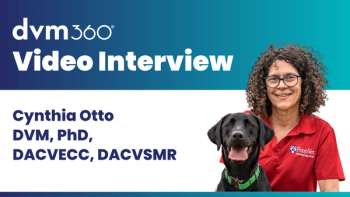
- dvm360 June 2024
- Volume 55
- Issue 6
- Pages: 14
Fostering LGBTQAI+ inclusion in veterinary medicine
In celebration of Pride Month, one dvm360 student ambassador shares how being in the LGBTQAI community helps him relate to fellow team members, clients, and even patients
This content is sponsored by VCA Animal Hospitals
Veterinary medicine is a truly unique and complex industry. We work with patients who do not talk to us and may come in all forms and sizes, ranging from dogs and cats to elephants and geckos. This diversity is not only reflective of patients but can be found among our veterinary staff members as well. Unlike other fields of work, more than half of veterinary medicine staff are women and approximately 7% of the field are members of the lesbian, gay, bisexual, transgender, queer or questioning, asexual or allied, intersex (LGBTQAI) community, which is twice the national average of adults in the United States.1 Being a part of the LGBTQAI space has not only allowed me to connect with clients on a deeper level but has allowed me to bond with patients in a way that may not be as obvious. Just like our patients who have little to no voice in society, many members of the LGBTQAI community feel similarly today.
June is a very special month for me because it marks the beginning of summer, which is absolutely my favorite season! Along with that, June is also a time of celebration, recognition, and empowerment. Born and raised in New York, I am lucky to be in an environment that allows for freedom of expression when it comes to my sexuality. Unfortunately, this has not always been the case. I have faced discrimination from both clients and professionals of veterinary medicine. From snarky comments to passive-aggressive body language, prejudice toward the LGBTQAI community is still alive and well. Luckily, the overall support I’ve garnered outweighs and surpasses the bigotry and hate.
Every professional of veterinary medicine plays a part when it comes to ensuring safe spaces and promoting authenticity. A few ways of showing support include but are not limited to displaying LGBTQAI flags on clinic doors, including pronouns on staff name tags, and providing gender-neutral bathrooms. The most impactful way of showing direct support is to chat with a member of the LGBTQAI community.
Be curious and ask questions. I promise you that we share more similarities than differences, and so what if we are different? Differences create diversity, and through diversity, equity, and inclusion, we can all provide better care for our beloved furry friends.
REFERENCE
1. A history of LGBTQ+ people in the veterinary profession. Pride Veterinary Medical Community. Accessed May 3, 2024. https://pridevmc.org/history/
Articles in this issue
over 1 year ago
A comprehensive guide to understanding veterinary telehealthover 1 year ago
The dilemma: Seven common complaintsover 1 year ago
Absorbable chemotherapeutic beads combat cancer in horsesover 1 year ago
Coastline keynotes for our Atlantic City conferenceover 1 year ago
How to find balance between rewards and consequencesover 1 year ago
Care for one, care for allover 1 year ago
Preparing for an emergencyover 1 year ago
Pride, not prejudice!over 1 year ago
Win back refillsNewsletter
From exam room tips to practice management insights, get trusted veterinary news delivered straight to your inbox—subscribe to dvm360.






